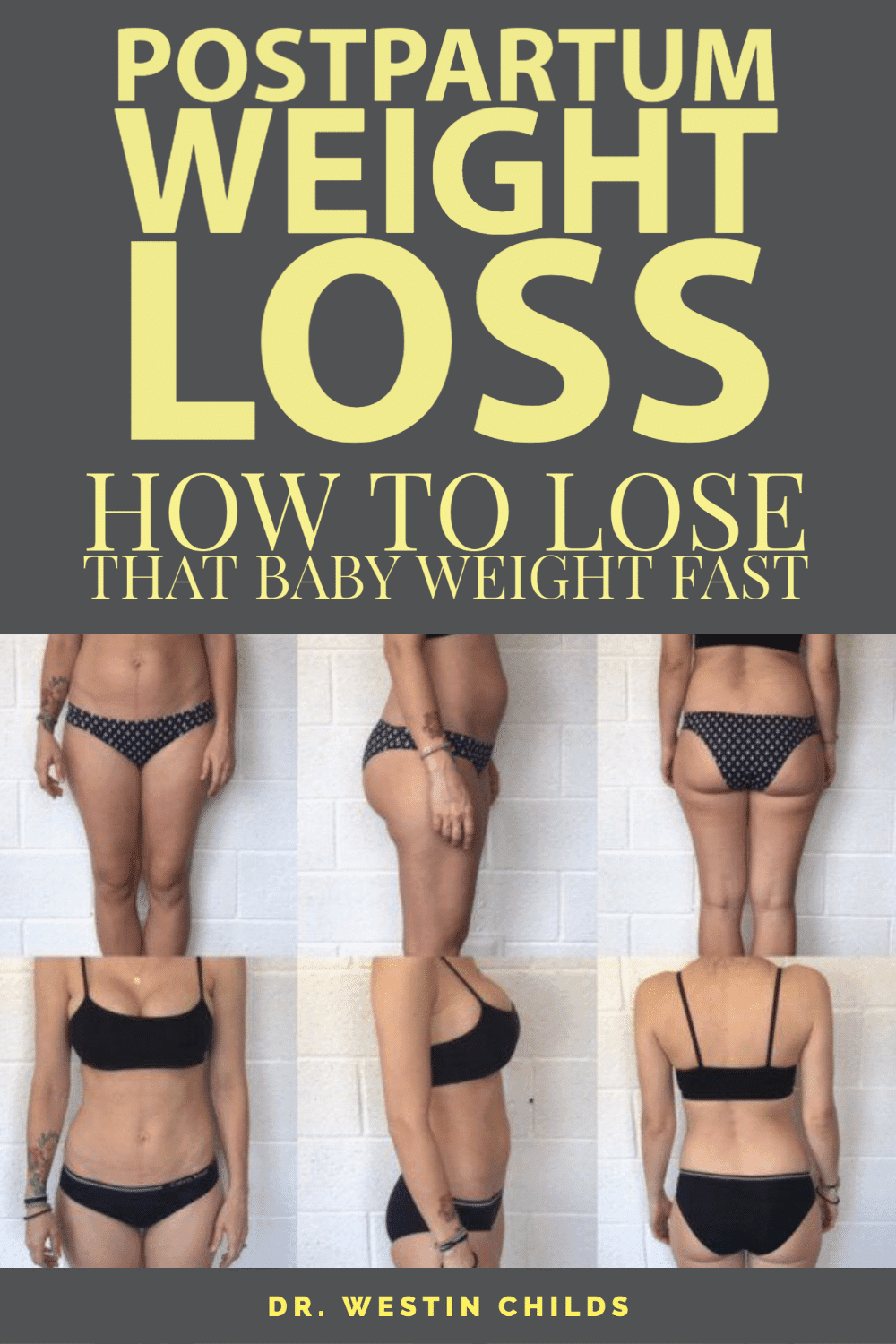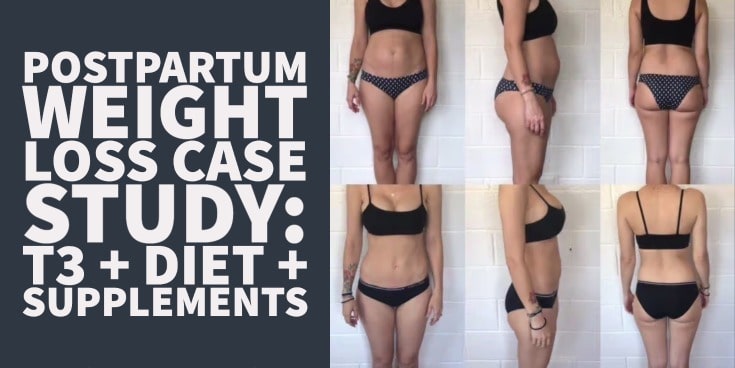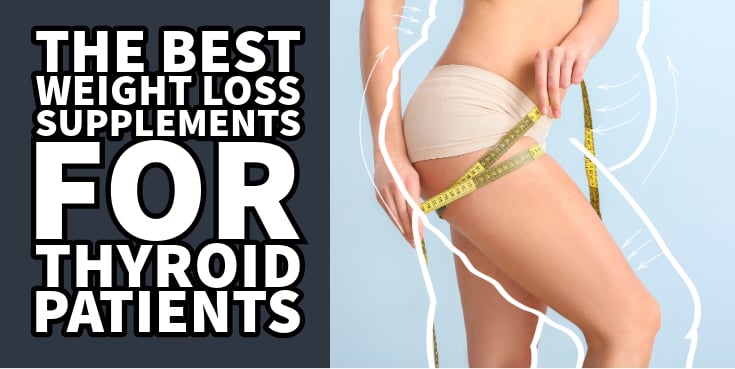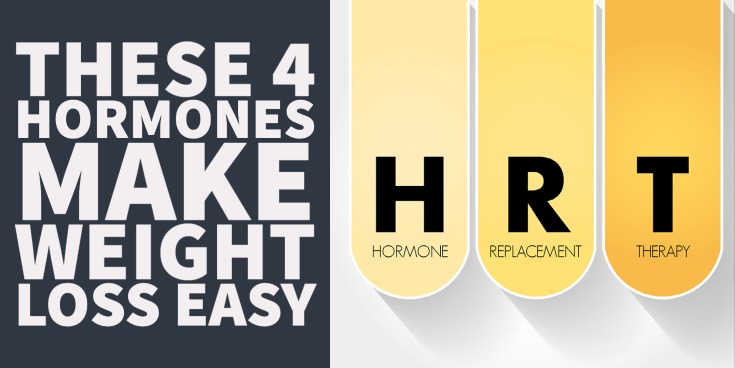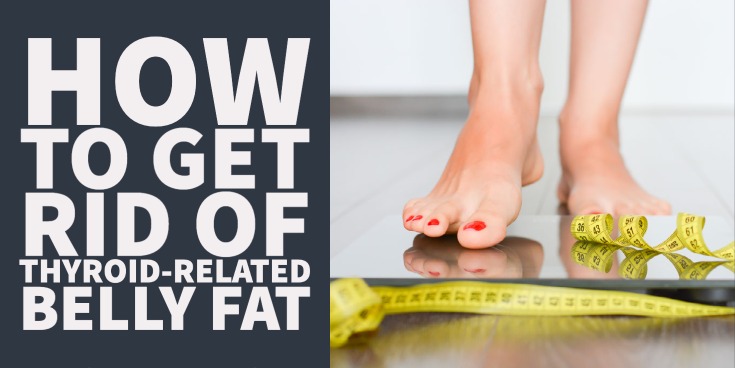This wouldn’t necessarily be a problem if weight loss after pregnancy was easy, but that isn’t the case.
With this crazy high incidence of weight gain, it’s no wonder that women search for weight loss programs to help with postpartum weight loss.
If you are struggling with weight loss after your baby then this is the guide for you.
I will walk through a case study of a patient who had difficulty with weight loss after her baby but was able to get back to her normal weight by balancing her hormones.
Let’s use her an example to talk about how to lose weight in the postpartum period:
(You can see her before/after pictures below)

Why is Postpartum Weight Loss so Difficult?
If you’re reading this then you are likely suffering from weight loss resistance after pregnancy.
And by weight loss resistance I am referring to a condition that makes weight loss difficult (and even feels impossible).
But why is it difficult to lose weight after you have a baby or in the postpartum period?
Shouldn’t weight loss be easy due to breastfeeding because of how calorie-intensive that process is?
Why is it that some women are able to lose weight so easily while other women struggle?
Why is it that it is easy for some women to lose weight after their first or second child but have a VERY difficult time after that?
If you are struggling with weight loss after pregnancy then you are NOT alone.
Many studies have shown that women struggle with weight loss after they have their babies (2).
But why is that?
The answer is probably more simple than you realize and it has to do with your hormones and NOT the calories that you consume or how much you are exercising.
Whether you realize it or not your hormones play a very important role in how effective your metabolism is and how your body burns fat (or doesn’t).
Hormones such as thyroid hormone, estrogen, progesterone, and also testosterone influence these important factors in your body.
It should come as no surprise to you that pregnancy is a time of great flux in your hormones (3).
These changes can be good (and indeed they are necessary), but they can also be a double-edged sword.
This post will walk you through a typical case study using a patient example (before and after pictures listed above) of how to actually lose weight and keep it off after you have your baby.
What may surprise you is that there is no simple “trick” involved.
It takes a multi-faceted approach (meaning you have to attack the weight from multiple angles) which I will outline below.
But let’s start our discussion with how your hormones change during pregnancy…
Pregnancy & Your Hormones
Pregnancy is a time of great changes to your hormone levels.
Estrogen (estradiol), progesterone and even thyroid hormone levels ALL must change during pregnancy to help promote fetal development.
These changes are necessary to help your child grow and develop normally, they also help protect against miscarriage and other pregnancy-related issues (4).
But these hormones (due to various factors) can go awry and lead to excessive and rapid weight gain during pregnancy and difficulty with weight loss in the postpartum period.
Let’s look at how pregnancy affects different types of hormones in your body:
- Estrogen – It is well known that estrogen levels increase during pregnancy. What you may not realize is that estrogen is a growth hormone in how it interacts with certain tissues in your body. In the presence of estrogen breast tissue enlarges, endometrial tissue can grow and even fat cells (adipose tissues) enlarge (5). High estrogen is great for pregnancy, but it can increase your risk of weight gain.
- Progesterone – Progesterone, much like estrogen, increases during pregnancy to support the fetal environment. Like estrogen, high levels of progesterone can also lead to weight gain.
- Thyroid Hormone – Thyroid hormone also increases during pregnancy. This increase in thyroid hormone can and should help increase metabolism and promote normal weight gain during pregnancy. Unfortunately, some women experience thyroid dysfunction during pregnancy due to autoimmune issues or nutrient deficiencies which may blunt this positive benefit (6).
- Insulin – Pregnancy is associated with an increased risk of developing insulin resistance and some studies suggest that pregnancy itself is a state of insulin resistance (7). High levels of insulin more easily promote weight gain and fat tissue enlargement.
- Appetite hormones – Hormones such as Leptin and Ghrelin influence the foods that you crave and how much food you eat (8). These cravings can lead to the consumption of unhealthy foods which may trigger (more easily) conditions such as insulin resistance which promotes weight gain, especially in the presence of high estrogen.
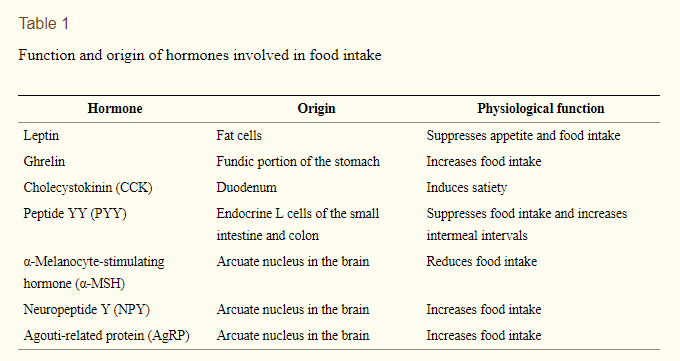
Understanding these basic hormones will help us understand why some women struggle with weight loss after pregnancy.
Well, let’s consider an example:
Suppose that you go into pregnancy with a slight imbalance in your hormones (this is not uncommon) with slightly elevated estrogen levels or estrogen dominance.
If you get pregnant and you are 10-15 pounds overweight then there is a high chance you have excess estrogen in the body due to aromatase conversion (9).
This alteration in estrogen and progesterone may also make getting pregnant difficult and may lead to an increased risk of miscarriage.
But despite this, you are still able to get pregnant.
During pregnancy, your estrogen levels and progesterone levels increase to support your baby.
This increase, on top of an already slight increase, causes more weight gain than normal.
So, already you are gaining more weight than what is recommended for pregnancy.
On top of this slight weight gain, you also have cravings for certain unhealthy foods (such as carbs, sugars, etc.) that you consume, probably more than you know you should.
Because pregnancy is associated with an increased risk of insulin resistance you also gain some more weight from this issue as well.
Now you have at least 2 hormone imbalances (higher than normal estrogen and insulin resistance) promoting weight gain during pregnancy.
What happens to these hormone imbalances after you give birth?
Do you think they are automatically reversed?
The answer is of course not!
Just because you give birth doesn’t mean that the imbalances will magically go away.
Instead, they are carried with you into the postpartum period where they make weight loss extremely difficult.
These imbalances can also contribute to depression, further food cravings, hair loss, and so on.
This makes the only logical way to lose weight in the postpartum period to focus on hormone imbalances and to treat those (more on that below).
Thyroid Dysfunction and Pregnancy
Before we jump into this case study we need to spend some time on thyroid function and pregnancy.
Pregnancy is a condition in which increased demand is placed on your thyroid gland.
Your thyroid must produce more thyroid hormone than usual to compensate for the developing fetal thyroid.
Lack of thyroid hormone results in serious consequences such as low IQ, pre-term delivery, and other developmental conditions.
The demand that pregnancy places on your thyroid may expose existing nutrient deficiencies or sub-clinical thyroid issues that you may not have been aware of prior to pregnancy.
Conditions such as sub-clinical hypothyroidism and minor iodine deficiency can be unmasked during pregnancy due to this increased demand and cause a number of hypothyroid-like symptoms.
In addition, pregnancy also places an increased demand on immune function which can trigger autoimmune diseases such as Hashimoto’s thyroiditis or post-partum thyroiditis.
These conditions can also cause hypothyroid symptoms such as weight loss resistance, hair loss, and depression.
It’s worth discussing the thyroid separate from other hormone imbalances because it can easily be tested for (and it should be) in the post-partum period.
A Simple Postpartum Weight Loss Plan (What this patient used)
With these hormone imbalances in mind, we can talk about how to actually lose weight in the postpartum period.
I’m calling this a simple guide to postpartum weight loss but you need to realize that this is specific to the patient I showed above (in the first image).
The therapies listed here may not work for everyone, but they can help serve as a guide for how you should be approaching weight loss in your body.
#1. T3 Thyroid Replacement (25mcg per day)
The first, and perhaps most important, part of this patient’s treatment was the use of a thyroid medication known as Liothyronine.
It was diagnosed that this patient was suffering from low T3 syndrome in the postpartum period (assessed through free T3 and thyroid testing).
Low T3 is a condition that results in low circulating levels of the most important thyroid hormone in the body known as triiodothyronine.
This particular patient did not have elevated antibodies or any other sign to suggest Hashimoto’s thyroiditis or another autoimmune disease.
Because of her low thyroid function, she was placed on T3 medication at 25mcg per day (a low dose).
This small addition helped boost her metabolism back up to normal levels to help her body actually burn fat.
T3 can be used safely and effectively, especially in place of T4 thyroid medications, as long as the TSH is monitored during therapy.
If you are struggling with weight loss and experiencing the symptoms associated with hypothyroidism such as weight gain, hair loss, depression, mood swings, and so on, then you need to have a complete thyroid panel tested by your Doctor.
You can learn more about testing your thyroid in this guide (which includes optimal ranges).
By using these reference ranges you will find that many of you may be walking around with sub-optimal thyroid levels without even knowing it which may be making your weight loss very difficult.
#2. Diet
Diet is always an important therapy in ANY weight loss regimen but it’s certainly not the only thing you should focus on.
What’s important to understand about your diet is that the diet YOU need will be different from your neighbor and other women out there.
Because of this there really isn’t a “postpartum weight loss diet” that will work for everyone.
I’ve known this particular patient for many years and because of working with her for so long, I knew exactly what type of diet she needed.
She was placed on a very high healthy carbohydrate-based diet with minimal fats, zero refined sugar, zero gluten, and zero dairy.
This diet was high in fruit-based carbohydrates (even carbohydrates such as rice and potatoes) and very low in even healthy fats such as olive oil and coconut oil.
Of course, she was also told to eat plenty of vegetables, drink plenty of water and avoid ALL processed foods.
The lesson to learn here is that you don’t necessarily have to jump on the ketogenic diet (high-fat diet) or a very low-carbohydrate diet to lose weight.
Weight loss CAN be achieved with other plant-based, vegetarian or vegan diets.
Instead of focusing on which one is the best you should focus on what your body needs.
For those interested her diet was high in the following foods:
- PLENTY of fruits (Mango, pineapple, cherry, apples, dates, blueberries, strawberries, and so on)
- Orange juice
- Starchy carbohydrates – Rice, potato, sweet potato, and so on
- Vegetable salad with homemade dressing (very light in fat)
- Meats such as chicken and beef
Her Diet was low in the following foods:
- MOST fats (including healthy and unhealthy) – Some people do better on low-fat diets vs high-fat diets and this patient had already unsuccessfully tried the ketogenic diet
- ALL refined sugars and added sugars (minus natural sugar from fruits)
- ALL processed foods
- ALL products containing gluten (gluten triggers depression and other mood changes in this patient)
- ALL dairy products (dairy is often a hidden cause of weight gain among patients and this patient noticed a significant improvement in gastrointestinal symptoms with the removal of dairy)
*Note: this is not necessarily the diet you should follow and you may find that you do better on a high-fat diet. To figure out what your body needs you should consult with a knowledgeable physician or nutritionist.
#3. Supplement Regimen
Supplements can, and often are, an important part of weight loss.
Using supplements can help provide your body with consistent nutrients that can be difficult to get from foods alone.
They are especially important in the postpartum period where your body is constantly changing and still has a high requirement if you are breastfeeding.
This patient used the following supplements to help with her overall health and weight loss:
- High-powered probiotic – High-potency probiotics can help promote weight loss by increasing the number of healing bacteria in the GI tract. To get this benefit you must use very high-potency probiotics such as the one this patient used.
- Hair regrowth complex – This patient was losing a significant amount of hair in the postpartum period which was halted with the use of specific nutrients such as choline and silicon.
- Berberine – Berberine helped to curb her sugar cravings and promote a normal appetite.
- Iodine – Iodine was used to ensure that she had proper thyroid function and that she was getting enough iodine for her baby as well. Both pregnancy AND lactation increase the demand for iodine usage in the body (10).
- Protein powder – Protein powder can help promote satiety and reduce cravings for unhealthy foods. This patient used 1 scoop of protein powder in a fruit smoothie each and every day.
- Greed (Red) Drink – Green drinks and powders high in vegetables and fruits can provide your body with plenty of antioxidants which can help fight inflammation and make weight loss easier.
#4. Breastfeeding
Another important therapy used in this patient was breastfeeding.
Breastfeeding increases caloric and metabolic function by producing breast milk for your baby.
This process is very energy intensive which means that your body will consume plenty of calories.
The longer you breastfeed the easier it is to lose weight and the healthier your baby will be.
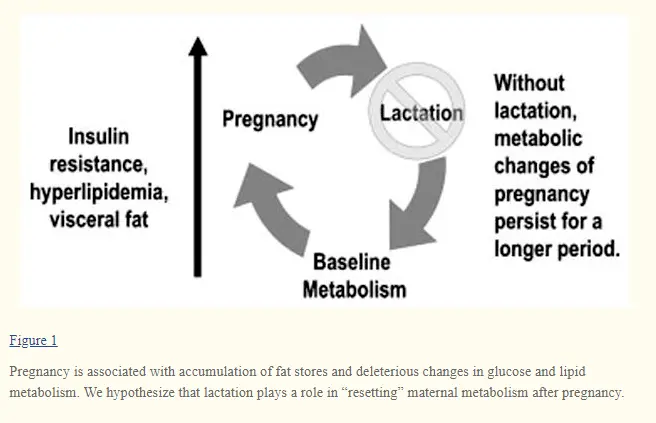
These studies suggest that breastfeeding and lactation, in general, play an important role in “resetting” your metabolism.
Not all women will be able to breastfeed due to a variety of reasons (such as work or their supply drying up), but if possible breastfeeding for at least 12-18 months is ideal.
Women who aren’t able to breastfeed may have difficulty with weight loss due to the persistence of hormone imbalances such as insulin resistance.
#5. Exercise (Yoga, Stretching, Diastasis Recti)
Exercise is important for weight loss but many people often put too much emphasis on it.
Remember:
Exercise puts increased stress on the body.
Stress is a good thing, but too much stress can actually cause more harm than good.
If your solution to weight gain is to simply reduce your calories and increase the amount that you exercise you will most likely not succeed long term.
This type of regimen is one that may cause metabolic damage, put increased demand on cortisol function, and (12) even damage thyroid function.
This patient was able to lose all of her baby weight by focusing on non-intensive exercise programs such as yoga and stretching.
She also practiced exercises to help increase core strength by fixing diastasis recti (13) (the normal separation of abdominal muscles during pregnancy).
Excessive exercise can be difficult to do in the postpartum period, especially if you are sleep deprived or focusing on being a mom.
Make sure that you do exercise, but focus on exercises that your body is capable of and exercises that won’t more stress than you need on your body.
Final Thoughts
Postpartum weight loss is absolutely possible, it just takes the right approach.
For best results, you should focus on balancing your hormones through the use of supplements, diet, and even medications if necessary.
This type of approach will allow you to not only lose weight but also feel like yourself again and help the transition from pregnancy back to normal life.
The best way to approach excessive weight gain during pregnancy is to make sure you go into pregnancy with your hormones balanced.
If you can do this, then it will make your life so much easier during the postpartum period.
Use this patient case study as a guide to help you on your weight loss journey!
Now I want to hear from you:
Are you suffering from weight loss resistance in the postpartum period?
Have you been able to lose weight? Why or why not?
Have you had your thyroid checked or other hormones checked?
Were you able to get treatment?
Leave your comments below!
